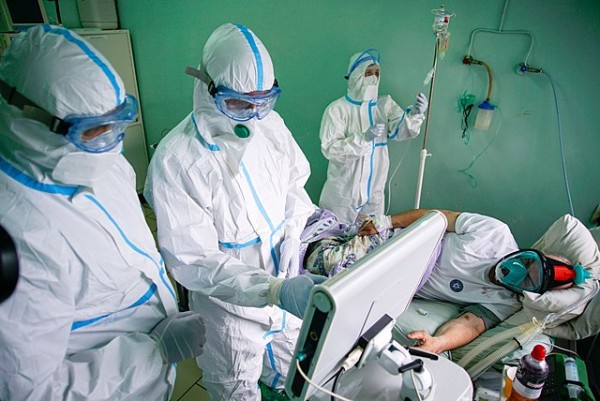Study Shows Tocilizumab Reduces Mortality in Critically-Ill COVID-19 Patients
Scientists from more than 60 sites across the nation, led by David Leaf, MD, MMSc and Shruti Gupta, MD, MPH from the Division of Renal Medicine at Brigham and Women's Hospital, have examined the effects of tocilizumab, an anti-inflammatory drug, on critically ill patients who have lab-confirmed COVID-19.
Contrary to the steroids, which more extensively suppress the immune system, tocilizumab particularly stops the pro-inflammatory cytokine receptor, IL-6.
Researchers found that when the drug was given within the patients' two days of admission to the intensive care unit, there was a "30-percent relative decline" and a 10-percent absolute reduction in death compared to those whose treatment excluded early use tocilizumab. These study findings were recently published in JAMA International Medicine.
ALSO READ: Doctors Say Excessive Handwashing in Fight Against COVID-19 Increased OCD Cases

COVID-19 patient wearing scuba mask in the absence of available artificial lung ventilation. Chernivtsi, Ukraine.
'Tocilizumab' for COVID-19 Patients
Leaf said tocilizumab has been being provided to patients for several years to treat a condition called the cytokine release syndrome or CRS, which can be seen in cancer patients who receive certain immunotherapy types.
In this COVID-19 setting, Leaf added, "It has been observed that much of the morbidity and mortality" that take place maybe because of the body's inflammation response to the virus, contrasting the virus itself.
As specified in the research, the monoclonal antibody tocilizumab is currently approved to treat certain conditions like rheumatoid arthritis and giant cell arthritis. This inflammatory condition affects large body vessels.
The drug is also given to cancer patients who have been given chimeric-antigen receptor therapy or CAR-T. This treatment can strengthen the immune system of the body to attack cancer cells. However, it can cause toxic side effects because of the CRS, which reports on the study described as "an overwhelming inflammatory response" that can lead to multiorgan failure.
Tocilizumab is administered to treat CRS in patients with cancer and is presently under investigation for administration in patients with COVID-19.
Since the onset of the pandemic, several studies on this drug have been conducted in different countries, including China and Europe, although none is extensive or thorough.
DON'T MISS THIS: COVID-19 Update: Recent Developments Regarding the Infectious Disease
An Approach that Examines if Tocilizumab Reduces Deaths in COVID-19
For this research, Leaf and the team used an approach called 'target trial emulation' to investigate if tocilizumab reduces deaths in COVID-19.
This methodology, considered a novel method of investigating observational data, mimics a randomized control trial to lessen bias.
According to Miguel Hernan, co-author of the study, pioneer of this approach, and biostatistics and epidemiology professor at the Harvard T.H. Chan School of Public Health, discussions on observational research biases tend to concentrate on lack of randomization. However, a lot of common biases of observational assessments have nothing to do with such a lack.
Professor Hernan added, emulating a target trial through the use of observational data enables them to remove those common biases "and appropriately focus the discussion on potential confounding" because of lack of randomization.
Conflicting Data
Even though there are conflicting data from various clinical tests regarding COVID tocilizumab's effectiveness in COVID-19, explained Gupta, the study's lead author, their research differs from these tests in various important ways.
First, he added, they focused particularly on severely ill patients. They also concentrated on the drug's early use, defined as the initial two days of admission to the ICU. Thirdly, they involved a much more significant number of patients, about 4,000 respondents, compared to roughly 400.
The study authors hope, said Gupta, that their results would encourage further examination of tocilizumab in COVID-19, especially that they are seeing a rise in cases across the nation.
In their analyses, the research team controlled for a wide-ranging list of covariates like "age, gender, race, ethnicity, comorbidities, acute severity of the disease, and concurrent therapies received."
Leaf said he hopes the study findings would "help inform the design of future," well-powered clinical tests evaluating early use of the drug in critically-ill COVID-19 patients.
Nonetheless, he added, "Given the cost and complexity" of conducting large-scale clinical tests in COVID-19, the present study "may be the best available evidence for tocilizumab in this setting for quite some time."
IN CASE YOU MISSED IT: Case Report at Children's National Hospital Raises Concern for Resistance to Antibiotic
Check out more news and information on COVID-19 on MD News Daily.
Oct 20, 2020 09:58 PM EDT





